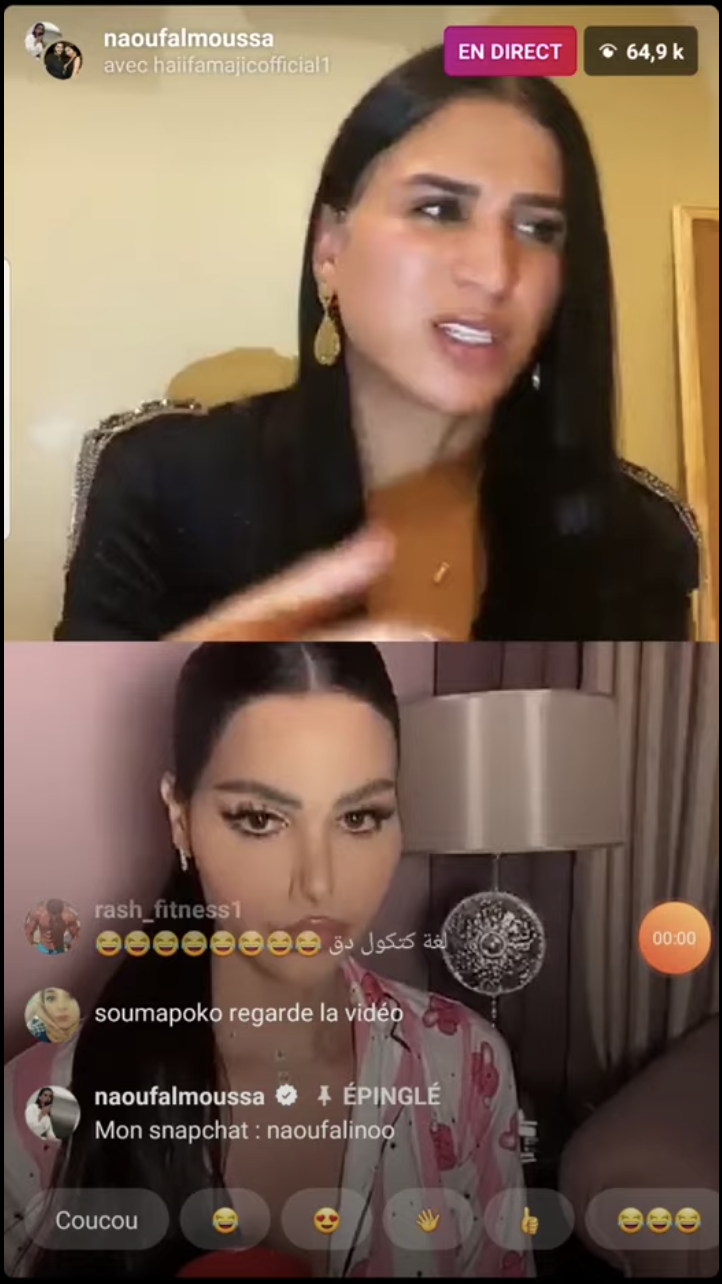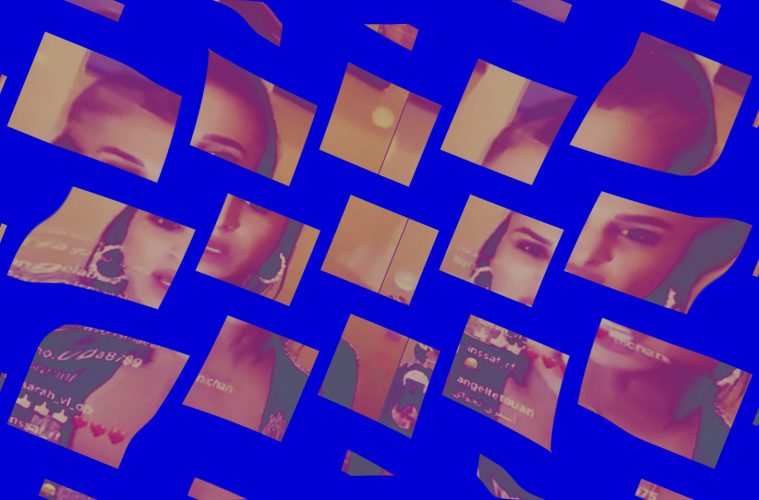Written by Anwar Bougroug
Copy Edited by Eliza Marks
Artwork by Mohammed Moe Mustafa
On April 13, 2020, during the lockdown caused by COVID-19, Moroccan influencer and trans woman Sofia Talouni, previously known as Naoufal Moussa, invited women in Morocco to install gay dating apps to “know and expose gay people around you… [and] create fake profiles to know who the nearby gay people around you are ” via a live broadcast on Instagram. Over 100,000 people were viewing. She wanted women that had mocked her to out homosexual males in their neighbourhoods. She deliberately provoked suspicion within communities and endangered especially gay men who kept their sexuality undercover to avoid legal penalty and social stigma common in Arab countries. She extended her attack further to LGBTQIA+ organizations and STD clinics, saying “there is no need to consult or seek those organisations help, they would only give you condoms and lube and encourage you to have more stigmatized sex.”
Members of Morocco’s LGBTQIA+ community say they fear for their lives after what’s happened. A Moroccan resident who witnessed a violent attack on a neighbor reported that “The family of a guy in my neighbourhood found out he was gay and they kicked him out on the street at 3:00 AM in the morning. He was crying while his dad was punching him in his face, just because his sister’s friend screenshot a picture of his Grindr profile and sent it to her.”
Talouni’s intentional and pointed “call to action” has especially grave implications during the COVID-19 lockdown in Morocco, when most who are falling victim to it are at home with their families. Subjecting victims to their abusers while locked inside and nowhere to go has made this situation extremely dangerous.
“Morocco is in total lockdown and everyone is home, so influencers can easily grab the attention of the public, as everyone is at home, connected online,” a spokesperson from Moroccan feminist and LGBTQ rights advocacy group Nassawiyat, a Moroccan feminist and LGBT rights advocacy group, told DW. In an email to Insider, another representative of the group wrote that, “We are facing a special case where a queer person that belongs to the community in a way is the one who made people in danger.”
While it’s not illegal to be homosexual in Morocco, Article 489 of the Penal Code criminalizes “lewd or unnatural acts with an individual of the same sex,” and can lead to fines and up to three years in jail. Homosexuality is also seen as a great sin by a large number of Muslim Moroccans, and homophobia and transphobia are common in the North African kingdom. Even if the violation of the individual’s privacy is illegal in Morocco, most of the victims are terrified of reporting the women that outed them for fear of what might happen if the police and authorities knew about their sexual orientation.
Being gay in Morocco carries social stigma, as well, which can result in being kicked out of their homes, experiencing difficulties finding jobs and housing, or public shame and harassment. Like many trans and non-gender conformists in the Arab world, Talouni herself has probably been stigmatized, verbally assaulted, and even physically abused. She hasn’t spoken to her dad in more than 20 years and has always searched for approval and love from the Moroccan society.
Despite this likelihood of being discriminated against herself, Talouni shows a deep hatred and envy towards gay cisgender males (those who identify as their assigned gender) in her live broadcasting, whom she believes carry the privilege of passing as straight as their perceived visual identity differs from the sexual orientation they identify. By exposing cisgender gay men, Talouni wanted to take public revenge against those who get by without facing the discrimination that she faces as an Arab trans woman in a Muslim society. For her, gay cis-males are worse than their straight counterparts, not only because some of them manage to live a double life without their sexuality exposed, but also for the simple reason that internalized homophobia and transphobia in the gay community is still very common.
Internalized homophobia and transphobia refers to the internalization of negative stereotypes, beliefs, prejudice and stigma associated with the LGBTQIA+ people that a person with same-sex attraction, whether they identify as an LGBTQIA+ person or not. By conforming to and promoting heteronormative cultural expectations through homophobic and transphobic statements and actions, people with internalized homophobia, such as Sofia Talouni, believe they are appearing more normal, gaining societal acceptance, and excluding themselves as potential targets of such stigma.
Even if most people would like to think that Talouni would support her community instead of being against it, she’s a clear example of how queer people don’t always act as allies to their communities,

Sofia Talouni and Haifa Magic during a live broadcasting chat on Instagram – April 16, 2020
It is never correct to call her out of her pronoun or gender, no matter what she has or hasn’t done. However, it is appropriate to criticize her use of words such as zwamel and lwaba, two extremely offensive and humiliating terms used in Morocco to address gay men, as well as her condescension of gay men who are more masculine in their behaviour, as if they are not true to themselves the way that she is. She believes, as does her Lebanese trans friend, Haifa Magic, that gay men are obliged to choose what gender norms to follow to fit into the heteronormative gender structures, and both disparage those who conform to neither male nor female gender norms. Talouni’s internalized prejudice is so deep that she doesn’t even believe the Moroccan state should give legal recognition to members of the LGBTQIA+ community, even if she’s openly part of it. By setting themselves apart from the “typical” gay man or gender non-conforming person, they believe they both appear purer, as they choose to conform to Arab heteronormative gender identities rather than transgressing, “If Morroco regaonizes LGBT+ rights, I’ll be the first to stand against it” she said during one live broadcast on Instagram.
Even if most people would like to think that Talouni would support her community instead of being against it, she’s a clear example of how queer people don’t always act as allies to their communities, by instead choosing to attack as a defense mechanism against the discrimination they are facing endlessly. Sofia Talouni also seems to suffer from narcissism and grandiose delusion, where she talks down on the ones she considers below her while speaking highly about herself: “I am the one that created a better image for you in Morocco you faggots. I showed the world that at least one of us is working, and not just being a prostitute.” She believes she is the saviour that changed the political and social landscape for the LGBTQIA+ community in Morocco. During one live broadcast, she even stated that they should raise a statue of her as a memorial of all that she has done for them.
On April 17th, four days after her dangerous act, her Instagram account was blocked after being reported for hate speech by a number of LGBTQIA+ allies. In an open letter posted on Instagram, Nassawiyat wrote, “We urge you to contact the concerned authorities to instantly suspend the Instagram account Naoufalmoussa pending review. Then, ban him/her from the platform due to the policy of hate/speech and violence.” A spokesperson for Facebook told Insider in a statement that, “We don’t allow people to out members of the LGBTQ+ community. It puts people at risk, so we remove this content as quickly as we can.”
Tragically, two young males have already committed suicide, dreading what might happen next to them if their families found out about their sexuality, while many are living in fear as a direct cause of what Talouni has done to them.
In considering the above, it becomes clear that this trans woman is not simply narcissistic or evil, but someone who carries a lot of hurt and agony. I’m not excusing or justifying what she did and said — it was a brutal attack on a community she claims to be a part of. However, I think this should be a wake-up call for everyone in order to understand the extreme hatred and internalized discrimination that exists within the LGBTQIA+ community, directly caused by heteronormative gender norms and government laws that make it unnecessarily challenging for queer people to live a simple, honest and secure life. This incident should make us think more about what and how people in the LGBTQIA+ community in the Arab world feel and act when they are discriminated against and rejected by their societies. Talouni would never have done what she did if she felt she were accepted with her trans and gay identity.
Furthermore, the LGBTQIA+ community in Morocco needs protection, and the Moroccan Parliament needs to urgently change the Penal Code 489 to protect a vulnerable minority from attacks and trends like the ones Talouni has created. Additionally, Morocco needs new legislation to address anti-LGBTQIA+ hate crimes urgently to deter such behaviour and place penalties on such actions.
If a member of the community can cause so much harm to its own allies, imagine what an enemy can do.

